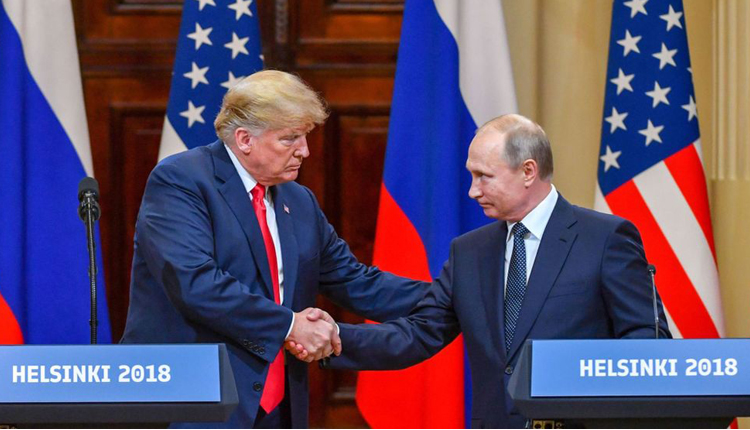Putin suggests Russia and US could cooperate to regulate oil prices
Russian President Vladimir Putin suggested that Moscow and Washington could work together to soothe volatility in the oil market that has roiled the industry in recent years.
Russia has partnered with OPEC and other producer nations since 2017 to manage nearly half of the world’s oil supply. The countries took action after crude prices sank to 12-year lows in 2016, piling pressure on oil-dependent economies and bankrupting hundreds of U.S. energy companies.
The United States, where drillers compete in a free market, is not part of the deal. U.S. laws prohibit companies from colluding to fix prices, and a bipartisan group of U.S. Congress members recently revived a push to punish OPEC for alleged price-fixing.
Still, Putin suggested that some form of cooperation is possible during a press conference with U.S. President Donald Trump in Helskinki on Monday.
“I think that we as a major oil and gas power, and the United States as a major oil and gas power as well, we could work together on regulation of international markets, because neither of us is actually interested in the plummeting of the prices,” Putin said.
“But nor are we interested in driving prices up because it will drain a lot of juices from all other sectors of the economy, so we do have space for cooperation here,” he said.
Trump has demanded that OPEC tame fuel costs, after a slow-and-steady rally accelerated this year. Led by Saudi Arabia and Russia, the two dozen producer nations last month agreed to hike output to offset falling output in Venezuela and looming U.S. sanctions on Iran, the world’s fifth largest oil producer.
Consumers around the world, as well as U.S. shale producers, suffer from price swings, Putin said.
Those shale drillers have used new technologies like hydraulic fracturing to push U.S. oil and gas production to all-time highs. That United States is already the world’s biggest natural gas producer and is now poised to top Russia as the global leader in oil output.
Last week, Trump said it was a “horrific thing” that Germany is allowing its companies to expand a natural gas pipeline with Russia. The Nord Stream 2 line is controversial because it will allow Moscow to bypass existing infrastructure in Ukraine to reach the lucrative Western European market. Russia has used its position as Europe’s biggest gas supplier as a tool of political pressure in the past.
The Trump administration has sought to crack into the European gas market by pitching exports of U.S. liquefied natural gas, a version of the fossil fuel super-chilled to its liquid form for export by sea. The cost of LNG is significantly higher for European buyers than gas piped in from Russia.
“We’ll have to be competing with the pipeline, and I think we’ll compete successfully, although there is a little advantage locationally,” Trump said, referring to Russia’s location on Europe’s doorstep. “So I just wish them luck.”
During last week’s NATO summit, Trump said Germany is “totally controlled” by Russian energy, forecasting that Berlin could soon import as much as 70 percent of its energy from Moscow. On Monday, he moderated his comments on Nord Stream 2, saying he is not certain the pipeline is in Germany’s best interest.
“I discussed with [German Chancellor] Angela Merkel in pretty strong tones, but I also know where they’re all coming from, and they have a very close source, so we’ll see how that all works out,” he said.
Putin said he reassured Trump that Russia will continue to ship natural gas through Ukraine after Nord Stream 2 is complete. Moscow is ready to extend a natural gas shipping contract that expires next year, pending a dispute between Russia’s Gazprom and Ukraine’s Naftogaz.
An arbitration court on Stockholm earlier this year ordered Gazprom to pay Naftogaz a net $2.56 billion, saying the Russian gas giant did not fully utilize Ukraine’s pipeline system to deliver supplies to Europe as contracted. Gazprom has appealed the decision.
The dispute erupted in 2014 shortly after Russia annexed Crimea and began its support for separatists in eastern Ukraine, who declared autonomy after protests toppled Ukraine’s pro-Russia president. In response to the annexation, the United States and Europe slapped sanctions on Russia’s energy sector.
The U.S.-Russia relationship has come under additional strain following an assessment by the American intelligence community that Russia waged a cyber campaign to tilt the 2016 U.S. presidential campaign in Trump’s favor. Trump has denounced an FBI special council investigation into the matter as a “witch hunt.”
On Monday, Trump said Putin is “a competitor, and a good competitor he is.”
“I think the word competitor is a compliment,” he said.
Source: CNBC


